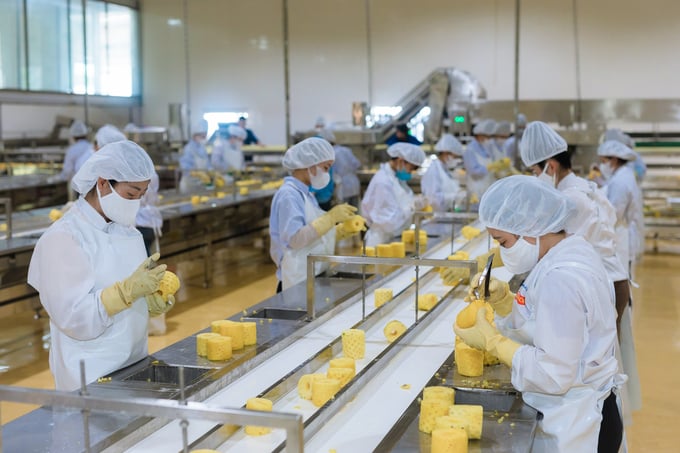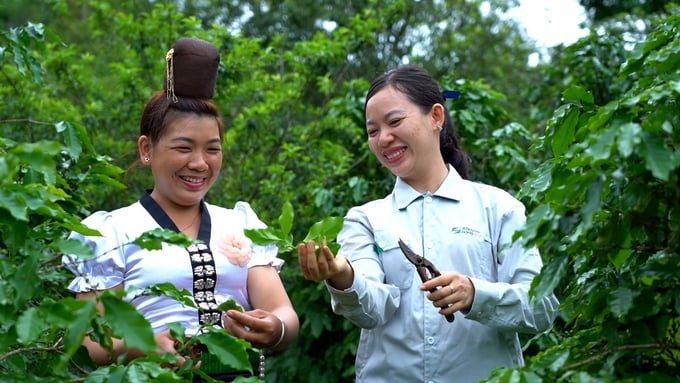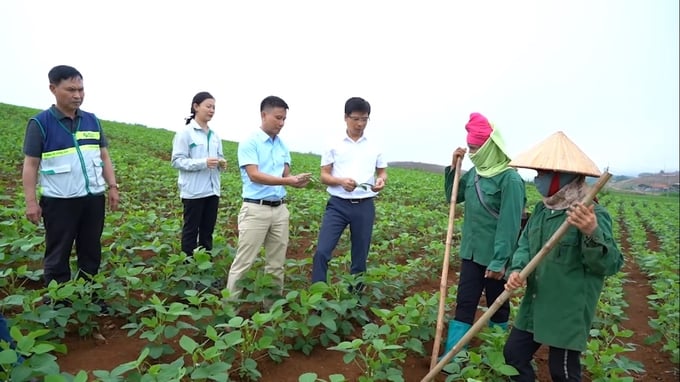May 16, 2025 | 10:27 GMT +7
May 16, 2025 | 10:27 GMT +7
Hotline: 0913.378.918
May 16, 2025 | 10:27 GMT +7
Hotline: 0913.378.918
Editor's note: Son La's agriculture is shifting strongly with the green and fast desire and towards clean production and applying high technology. Son La is building large raw material areas to serve production and processing; attracting investment from large businesses such as DOVECO to complete the production chain; and continuously searching and developing markets.
After a transformation process, Son La has had lessons in building linkage chains and solutions to develop the agricultural product market. To clarify these issues, Vietnam Agriculture Newspaper organized a talk show with two esteemed guests: Mr. Nguyen Thanh Cong, Vice Chairman of the Son La Provincial People's Committee, and Mr. Nguyen Thanh Tung, Deputy General Director of Dong Giao Foodstuff Export Joint Stock Company (DOVECO).
Mr. Nguyen Thanh Cong, from the story of Son La and the practice of DOVECO Son La, could you share Son La province's commitments to the business community as well as the province's policies to attract investment and accompany to have more and more sustainable linkage chains of Son La agricultural products, sir?
Mr. Nguyen Thanh Cong: When investors such as DOVECO, IC Food, TH, Phuc Sinh Factory, Minh Tien Factory, etc. invest in Son La's agricultural sector, the first issue must be the raw material area. Only when the raw material area is enough to meet capacity for the whole year will investors dare to invest. That proves that investors must research very carefully before investing in a certain province, and that province must build policy mechanisms to attract investors.
Regarding Son La province's companions, firstly, from Resolution 128 of the Provincial People's Council and policies, the province issued decisions, such as Decision 1818 to support production and Resolution 51 to support raw material areas.
Secondly, in addition to policies, the province's officials accompany businesses to build and expand production areas in the direction that whatever the factory needs, the province will organize stable production. For example, DOVECO is making sweet corn, soybeans, and vegetables, processing Son La's available longan and mango products, or opening more baby cucumber, spinach, etc. So, the province directed the Department of Agriculture and Rural Development of districts and the cooperative system to combine with the factory to build and develop growing areas so that those growing areas have stable production throughout the year to serve the DOVECO factory in particular and other processing factories.

For processing factories, the first issue must be the raw material area. Photo: Tung Dinh.
Thirdly, strengthen the cooperative system because factories or investing businesses must sign through cooperatives. Cooperatives have legal status and are fully qualified to coordinate with factories to organize production for farmers. Particularly, it is compulsory to build exemplary, typical, and core cooperatives in developing raw material areas.
Additionally, we must coordinate very well with factories to resolve difficulties and obstacles in their agricultural product processing process in Son La. If the province, district, commune, village, and cooperatives do not accompany the business, it will be very difficult to overcome difficulties.
Therefore, the environment; building raw material areas; policy mechanisms; and the leadership, direction, support, and help to create all conditions for processing factories are four prerequisites for processing factories to well perform their production tasks and stand firmly in Son La province.

Son La's community agricultural extension is very good. Photo: Hoang Anh.
Mr. Nguyen Thanh Tung, from the practice of DOVECO Son La, what are the lessons learned from Dong Giao in other localities, sir?
Mr. Nguyen Thanh Tung: In addition to the comprehensive support and facilitation of the Provincial Party Committee, the Provincial People's Council, the Provincial People's Committee, and localities throughout the province, especially the support, companionship, and response of people of all ethnic groups in Son La province, it can be said that DOVECO has brought the first experience of deploying raw material areas from Son La to implement in other provinces.
DOVECO is supporting farmers in the stages of seeds, land survey, and land preparation, especially technical support, so that farmers can have the initial experience and capital to be able to deploy raw material areas in Son La.
The second lesson is about deployment to farmers. DOVECO's technical staff is not many, but the agricultural extension staff of the Department of Agriculture and Rural Development of Son La province, especially the provincial departments, provided great support in deploying DOVECO's raw material areas to farmers.
The third lesson is about the community agricultural extension group, which is currently a model in some provinces. Son La province has a good community agricultural extension group, so I think this model should be applied in other provinces.

DOVECO deploys raw material areas in Son La. Photo: VAN.
As of now, Son La has had five recognized high-tech agricultural areas. Along with that are 12 science and technology enterprises, of which 11 operate in the agricultural sector.
Mr. Nguyen Thanh Cong, How do you evaluate the role of the business community in the journey to find agricultural product markets in Son La, sir?
Mr. Nguyen Thanh Cong: Through a period of developing and building a system of businesses in agro-forestry-fishery product processing in Son La province in particular and in the whole country in general, Son La realized the role of the system of businesses building agro-forestry-fishery product processing factories, especially fruit and industrial product processing.
First, they have contributed to the sustainable development of agriculture. Because only large processing factories can create large products and deeply processed products, bringing higher surplus value.
Second, with these processing factories, a sustainable and closed production chain between factories, businesses, cooperatives, and farmers is formed. Of which, farmers produce sustainably in terms of both input and output of products and sustainably in terms of technical factors in production. Thereby contributing to increasing the value per hectare of cultivation for farmers. However, the more basic values are farming techniques and labor ability, and importantly, the sustainable development of farmers and businesses.
Third, create jobs for farmers, businesses, and especially unskilled farmers, thereby creating a very large labor source. A large labor source will bring a large income, and from there, contribute to socio-economic development, sustainable poverty reduction, and new rural construction associated with creating jobs, creating livelihoods and synchronous social security, and building a developed society.
Thank you, sir!
Translated by Thu Huyen

(VAN) Cold-barn systems efficiently manage environmental and temperature conditions, which aids in the prevention of respiratory diseases in pigs and protects them from the vectors that transmit African swine fevers.

(VAN) To tackle challenges, the project 'Addressing key technical bottlenecks in the grouper supply chain in Vietnam' has been underway since 2024.

(VAN) The project 'Disease-Resilient and Sustainable Cassava Production Systems in the Mekong Region', funded by the Australian Center for International Agricultural Research (ACIAR), is being implemented from 2024 to 2028.

(VAN) Data from 10,000 farming households will help professionalize production organization and support the implementation of the One Million Hectares Program for High-Quality, Low-Emission Rice Cultivation.

(VAN) FAO Director-General QU Dongyu marks International Day of Plant Health at NENA conference.

(VAN) Deputy Minister of Agriculture and Environment Hoang Trung affirmed that floriculture and ornamental plants are a growing industry that receives significant global attention.

(VAN) The three staple crops dominating modern diets – corn, rice and wheat – are familiar to Americans. However, fourth place is held by a dark horse: cassava.